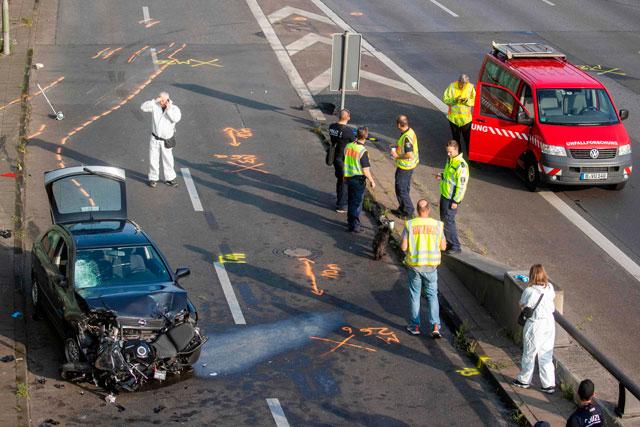- International News
- Thu-2020-08-20 | 10:22 pm

Police said the man caused three accidents on the Autobahn 100 in the Tempelhof-Schoeneberg district shortly before seven pm (17:00 GMT) on Tuesday, before claiming that a box in his car contained a "dangerous object".
The 30-year-old Iraqi had targeted motorcyclists in particular in a "quasi hunt", a spokesman for the prosecution told a press conference.
Local media reported that the man had shouted "Allahu Akbar" (God is Greatest) when he emerged from his mangled black Opel Astra.
"The possibility of an Islamist attack cannot be ruled out", prosecutors said in a statement.
The suspect was arrested on suspicion of attempted murder in at least three cases and later today was to face a judge who will decide whether he should be placed in a psychiatric facility.
One of the injured was a firefighter, said Berlin interior minister Andreas Geisel, adding that he was "dismayed that innocent people have fallen victim to a crime out of nowhere”.
"We must be aware that Berlin remains a focus of Islamist terrorism,” he added.
German media reported that a motorcyclist was also among the injured.
Religious slogans
The suspect had published clues on social media that he was planning an attack, according to the DPA news agency.
He had posted photos of the car used for the attack on Facebook, along with religious slogans, the report said, citing a spokesman for the prosecution.
"Nobody come any closer or you will all die,” the Bild newspaper quoted the suspect as saying after he got out of his car and placed the metal box on the roof.
His vehicle was apparently brought to a halt after crashing into a motorbike.
However, when police opened the box using high-pressure water jets it was found to contain nothing but tools.
The motorway was closed for several hours, causing significant traffic jams with drivers asked to leave their vehicles as a precaution.
Investigators have not found any links to a terrorist organisation so far, prosecutors said.
Violent attacks
People with ties to extremist groups have committed several violent attacks in Germany.
The deadliest was a truck rampage at a Berlin Christmas market in December 2016 that killed 12 people.
The Tunisian attacker, a failed asylum seeker, was a supporter of the Daesh terror group.
More recently, an extremist and his wife were convicted of planning a biological bomb attack in Germany in 2018 with the deadly poison ricin.
The pair had ordered castor seeds, explosives and metal ball bearings on the Internet to build the toxic bomb.
The man was sentenced in March to 10 years in prison while his wife received an eight-year sentence in June.
Since 2013, the number of extremists considered dangerous in Germany has increased fivefold to 680, according to security services.
The far-right has often accused Chancellor Angela Merkel of having contributed to the extremist threat by opening the country’s borders to hundreds of thousands of migrants in 2015.













